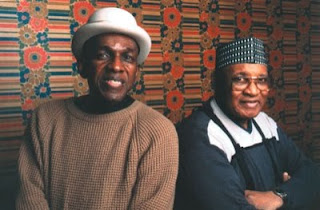
Photo: Fred Anderson, right, with Robert Barry—by Nathan Mandell
I realized last night that I did not say a proper goodbye to Fred Anderson. I wrote a brief, hasty obituary for the Volume, but there's more to say.
Like Bill Dixon, a contemporary whose death preceded Anderson's by just eight days, Anderson was an artist whose work I returned to obsessively. And as in the case of Dixon, what I kept searching out over and over was a sound. In Anderson's case, a very ripe, robust, steely thing that reminded me of liquid metal.
I also admired the no-nonsense-ness of Anderson's approach. He was a saxophonist who favored freeform improvisation but who was always careful to plot his own architecture as he went. When I listen to Anderson, I don't hear the quasi-religious questing evident in Coltrane and many of his acolytes. I simply hear a man working through some lines on his horn—spiraling off from metric time but always rooted in hard, hard swing and soul. It was as though he were saying to his capital-F, capital-J Free Jazz contemporaries and billmates (frequent partner Kidd Jordan among them): "I respect what you're doing up there in the stratosphere, but I have plenty of material to hash out right here on Earth."
That notion fits almost too conveniently with Anderson's status as a kind of blue-collar stalwart of the scene—staying rooted in Chicago, installing carpet or tending bar to keep his family going while his cohorts in the AACM (with whom, again, he shared very little in terms of style) brought their music to the world. But I think you can hear the humility in the playing. Anderson never doubled on another horn, never experimented much with bandbuilding or compositional form or extended techniques. He was content to write a few stark lines ("Dark Day," "Within," etc.), let those be the guideposts of his career, and just play and play.
My favorite Anderson context is the sax-drum duet. No disrespect to Interstellar Space, which I adore, but since that album has given way to so many carbon copies, it's amazing to hear an artist who approached the form in an entirely different way. And no disrespect to the Anderson's constant collaborator, Hamid Drake, but I feel that Anderson was at his best alongside two other percussionists: Steve McCall and Robert Barry. Vintage Duets, a 1980 duo session with McCall that came out 14 years later on Okka Disk, is a fine release, though the document that really gets me is an unreleased recording of the pair playing at the Chicago Jazz Festival in 1986, passed to me by a friend, who got it from a friend. The music is tougher, bolder than the earlier date, yet still with this deep sense of calm. The opening 25-minute version of "Within" might be the finest single Anderson performance I've heard. I love how Anderson doesn't feel the need to ratchet up in intensity as he plays. In other words, there's no sense of that hackneyed free-jazz climax, which inevitably comes too soon and leaves the performance with nowhere to go. McCall cruises, Anderson cooks, and those are the simple revelations of the gig.
(Re: the recording mentioned above, I could easily share it online, but I'm wary of the ethics involved, especially so soon after Anderson's passing. Anyone have any thoughts on that?)
The other towering Anderson masterwork, for me, is Duets 2001, a Thrill Jockey disc featuring Robert Barry. I have pretty much zero awareness of Barry before or after this session. (I know he's worked with Ken Vandermark, but I haven't heard those records; here's a 2008 interview, which I'm going to check out as soon as I'm done with this post.) I can't even tell you how much I used to play this album. Haven't heard it for several years, but it's on now as I type. To me, this is the Truth. A center of calm. Barry heats it up at times, but the greatest moments are the sublimely laid-back tracks, like the opening "bouncing." This is go-where-it-may music, unfolding infinitely. Could stop now, could go on forever. Always swinging. It gives a feeling of air, of buoyancy—quiet, unassuming creativity that is its own reward.
Now I think I'm the one listing toward post-Coltrane-y mumbo jumbo, so I'll stop. If you haven't heard Duets 2001, though, please obtain it. It is jazz of *no school* whatsoever and yet it is most assuredly jazz. That was Anderson's gift to his musical sphere, to exist outside of stream and current and trend and yet not to deprive you of what you loved about bebop and free jazz alike. Taking the lessons he learned from Charlie Parker (seemingly his No. 1 muse), freeing them up and meditating on the results. For a long, long time.
P.S. If you like Duets 2001: Another underrated record that partakes of a similar buoyant, unhurried vibe is William Parker's Bob's Pink Cadillac, also recorded in 2001, and featuring clarinetist Perry Robinson and drummer Walter Perkins. I can't recommend this highly enough.
1 comment:
i recently fell in love with anderson/mccall's "vintage duets," so of course i would love to hear the live bootleg. i would guess that since these two maestros are gone from the earth, their estates/families/colleagues would be happy that their music is being shared, so that their art lives on.
but i understand your ethics concerns--it is indeed a grey area. perhaps you could reach out to the AACM, or anderson's family, for permission? have it posted somewhere like destination-out?
thanks for the tribute, and your writing in general.
Post a Comment